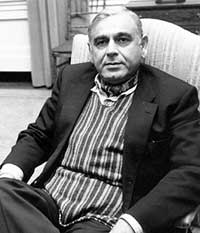 KOLKATA - What happens when an Indian Oscar-wining filmmaker adapts on celluloid a novel by a controversial Indian Nobel laureate on the immigrant Indian community in the Trinidad of the 30s?
KOLKATA - What happens when an Indian Oscar-wining filmmaker adapts on celluloid a novel by a controversial Indian Nobel laureate on the immigrant Indian community in the Trinidad of the 30s?
The outcome is sheer movie magic-a feast for the eyes and minds of cinema enthusiasts across the world, a toast in the international film festival circuit and even a cue for many to peep into the history of the Caribbean islands.
India-born, New York-based producer-director Ismail Merchant now basks in the rave response to his screen adaptation of The Mystic Masseur, one of the best known novels of this year's Nobel literature winner VS Naipaul and based on the Indian diaspora in Trinidad.
"We were apprehensive about obtaining the rights to the novel from Sir Vidia. But I think because of our reputation he entrusted us with the novel," said Merchant, the Oscar-winning director-producer of the famous Merchant Ivory Production.
The film brings alive the saga of Indian indentured labour that arrived in the Caribbean to work on the sugar plantations in the second half of the 19th century, after slavery had been abolished in the British Empire. The Mystic Masseur is a rare insight into the warmth and humour of these characters' lives as the Indian community in Trinidad began to grow and prosper.
The film, at times hilarious, is the story of the rise and fall and the final acceptance of life of the protagonist Ganesh Ransumair (played by Asif Mandavi), a schoolteacher with the outsized ambition of becoming an author and later a politician in Port of Spain.
Merchant recalled wooing the London-based Sir Vidia before he finally obtained the filming rights for The Mystic Masseur. "I went on location-hunting to Trinidad and returned to London with photographs of Sir Vidia's home, possible location and the Indian community there. Then I invited him and his wife Nadira to dinner at my London flat."  "I cooked mackerel for him. I had brought chilli sauce from Trinidad. I put in a little tamarind. And then my daal (pulses) with lemon. But Nadira came into the kitchen and told me that Naipaul hated mackerel. Well, it was too late, and I took the platter in. Naipaul tasted it, looked at me and said it was splendid," said a beaming Merchant, whose culinary skills are formidable.
"I cooked mackerel for him. I had brought chilli sauce from Trinidad. I put in a little tamarind. And then my daal (pulses) with lemon. But Nadira came into the kitchen and told me that Naipaul hated mackerel. Well, it was too late, and I took the platter in. Naipaul tasted it, looked at me and said it was splendid," said a beaming Merchant, whose culinary skills are formidable.
"Making this film was one of the most pleasant of experiences," said Merchant. "It was as if the whole island had turned up and the spirit of Naipaul was everywhere. There are great actors there in Trinidad and they were willing to contribute more than the script asked of them."
Said screenplay writer Caryl Phillips, "When I read the book for the second time, I was convinced that it was a book which not only could be filmed, but was one that was rich in character, in comedy, and full of pathos."
"The early novels of VS Naipul, including this novel, had always held a special appeal for me as they seemed to depict a Trinidad that the author had some affection for. I felt it would be a challenge to adapt this novel for the screen," Phillips said. "Caribbean life has been underrepresented in the cinema, and the islands have often been used as little more than an exotic backdrop for stories of people whose lives are not invested in the region. Ismail Merchant appeared to be ready to address this problem," he said.
"As a writer, working on The Mystic Masseur was a privilege. A wonderful novel, a beautiful island with an enthusiastic and supportive populace, and a film company prepared to woo me, not with false promises, but with the assurance that they would include me in key decisions along the way," he added. Says internationally-renowned Indian actor Om Puri, who played an important role in the film: "Working with Merchant was a great pleasure. I worked on my accent a lot to make it perfect."
The film has received praise in the United States. Cinema doyen Roger Ebert of the Chicago Sun-Times wrote: "With great cast, performances, beautiful cinematography and an excellent music score, the richly-layered Masseur is an enchanting piece of work."
But Ismail Merchant's celluloid courtship with Nobel laureates seems to have only just begun. "I am going to capture on celluloid the intellectual bonding of two of the greatest litteratteurs of the last century-Bengali literary giant Rabindranath Tagore and French author, savant and philosopher Romain
Rolland," said Merchant. "We have started research on this project. Catherine Berge, who directed Merchant Ivory production Gaach three years back and Caryl Philips, screenplay writer of The Mystic Masseur are currently working on it," said the maker of memorable screen versions as literary classics Howard's End, Maurice and A Room With A View.
However, Merchant's next venture is a project based on a novel by Diane Johnson. "Our next film is La Divorce," says the maker of some 46 feature films who has just completed shooting of Merci Docteorey based on their original screenplay and set in Paris. Merchant, who on 19 November was conferred the New York State Governor's Arts Award at Metropolitan Museum of Art in the Big Apple, marked his fortieth anniversary in film career in April this year with the release of another celluloid adaptation of literature, The Golden Bowl. Merchant is also toying with the idea of filming the recent works of such noted Indian authors as Shashi Tharoor (Riot) and Amitav Ghosh t(The Glass Palace). (IPS)


